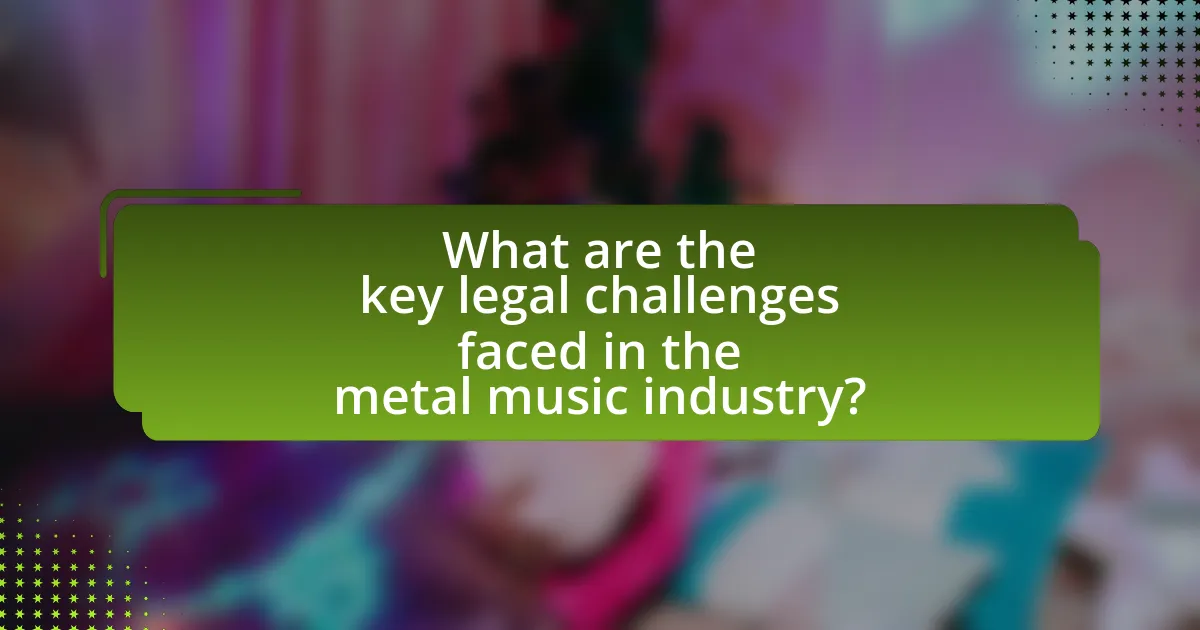The article focuses on the legal challenges faced by the metal music industry, highlighting issues such as copyright infringement, contract disputes, and trademark concerns. It examines the impact of copyright laws on musicians, common copyright issues encountered by bands, and strategies for protecting original works. Additionally, the article discusses the significance of contracts in defining relationships within the industry, the implications of trademark laws for brand identity, and the regional variations in legal challenges. It emphasizes the importance of legal awareness and proactive measures for metal musicians to navigate these complexities effectively.

What are the key legal challenges faced in the metal music industry?
The key legal challenges faced in the metal music industry include copyright infringement, contract disputes, and trademark issues. Copyright infringement arises when music is used without permission, which is prevalent in the digital age where unauthorized sharing is common. Contract disputes often occur between artists and record labels regarding terms of agreements, royalties, and creative control, leading to legal battles that can be costly and time-consuming. Trademark issues can arise when band names or logos are similar to existing trademarks, resulting in potential lawsuits over brand identity. These challenges are significant as they can impact an artist’s career and financial stability, highlighting the importance of legal awareness in the industry.
How do copyright laws impact metal musicians?
Copyright laws significantly impact metal musicians by protecting their original compositions and performances from unauthorized use. These laws grant musicians exclusive rights to reproduce, distribute, and publicly perform their works, which is crucial in a genre where originality and artistic expression are paramount. For instance, the U.S. Copyright Act of 1976 provides automatic protection for original works, allowing metal musicians to seek legal recourse against infringement, such as unauthorized sampling or cover versions without permission. This legal framework not only safeguards their creative output but also enables them to monetize their music through licensing deals and royalties, which are essential for sustaining their careers in a competitive industry.
What are the common copyright issues encountered by metal bands?
Metal bands commonly encounter copyright issues related to song ownership, unauthorized sampling, and infringement of visual artwork. Song ownership disputes arise when multiple members contribute to a track, leading to disagreements over rights and royalties. Unauthorized sampling occurs when bands use portions of other artists’ music without permission, risking legal action. Additionally, visual artwork, such as album covers, can lead to copyright conflicts if artists do not secure rights or licenses for images and designs. These issues highlight the importance of clear agreements and legal protections in the music industry.
How can metal musicians protect their original works?
Metal musicians can protect their original works by registering their music with copyright offices and utilizing performance rights organizations. Copyright registration provides legal proof of ownership and allows musicians to enforce their rights against unauthorized use. For instance, in the United States, registering with the U.S. Copyright Office grants the ability to sue for statutory damages and attorney fees in case of infringement. Additionally, joining organizations like ASCAP or BMI helps ensure that musicians receive royalties for public performances of their music, further safeguarding their financial interests.
What role do contracts play in the metal music industry?
Contracts serve as essential legal instruments in the metal music industry, defining the rights and obligations of artists, producers, and labels. They establish terms for recording, distribution, and performance, ensuring that all parties understand their responsibilities and the financial arrangements involved. For instance, a recording contract typically outlines the percentage of royalties an artist will receive, which can range from 10% to 25% of sales, depending on the negotiation power of the artist and the label’s standard practices. Additionally, contracts help protect intellectual property rights, ensuring that the music created is legally owned by the artist or the label as agreed. This legal framework is crucial for resolving disputes and safeguarding the interests of all stakeholders in a highly competitive industry.
What types of contracts are essential for metal bands?
Metal bands require several essential types of contracts to navigate the music industry effectively. These include recording contracts, which outline the terms between the band and a record label regarding the production and distribution of music; management contracts, which define the relationship between the band and their manager, detailing responsibilities and compensation; and performance contracts, which specify the terms for live shows, including payment, venue obligations, and cancellation policies. Additionally, licensing agreements are crucial for allowing the use of the band’s music in various media, while merchandise agreements govern the sale of band-related products. Each of these contracts serves to protect the band’s interests and ensure clarity in their professional relationships.
How can musicians negotiate favorable contract terms?
Musicians can negotiate favorable contract terms by thoroughly understanding their rights and the specifics of the contract before signing. This involves researching industry standards, seeking legal advice, and being prepared to discuss key elements such as royalties, rights to their music, and performance obligations. For instance, a study by the Music Industry Research Association found that musicians who engage legal counsel during contract negotiations secure better terms, including higher royalty rates and more favorable rights retention. By leveraging knowledge and professional support, musicians can effectively advocate for their interests in contract discussions.
What are the implications of trademark laws for metal bands?
Trademark laws significantly impact metal bands by protecting their brand identity and preventing unauthorized use of their names and logos. These laws enable bands to establish exclusive rights to their trademarks, which can enhance their marketability and fan recognition. For instance, if a metal band registers its name as a trademark, it can legally prevent other entities from using a similar name that could cause confusion among fans. This legal protection is crucial in a competitive industry where branding plays a vital role in a band’s success. Additionally, trademark infringement can lead to costly legal disputes, emphasizing the importance of understanding and navigating these laws effectively within the metal music scene.
How can metal musicians secure their band names and logos?
Metal musicians can secure their band names and logos by registering them as trademarks. Trademark registration provides legal protection, preventing others from using similar names or logos that could cause confusion in the marketplace. According to the United States Patent and Trademark Office (USPTO), a registered trademark grants the owner exclusive rights to use the mark in connection with their goods and services, which is crucial for establishing brand identity in the competitive music industry. Additionally, conducting a thorough trademark search before registration can help identify potential conflicts with existing trademarks, further securing the band’s name and logo.
What are the risks of trademark infringement in the metal scene?
Trademark infringement in the metal scene poses significant risks, including legal action, financial penalties, and damage to reputation. Bands or entities that use similar names, logos, or branding without permission may face lawsuits from trademark holders, which can result in costly legal fees and potential settlements. For instance, in 2017, the band “Metallica” successfully pursued legal action against a clothing company for trademark infringement, highlighting the financial and reputational stakes involved. Additionally, trademark disputes can lead to confusion among fans, diluting brand identity and undermining the original entity’s market presence.

How do legal challenges vary across different regions in the metal music industry?
Legal challenges in the metal music industry vary significantly across different regions due to differing copyright laws, licensing requirements, and cultural attitudes towards music. For instance, in the United States, the legal framework is heavily influenced by the Digital Millennium Copyright Act, which affects how metal bands distribute their music online. In contrast, European countries often have more stringent regulations regarding performance rights and collective licensing, as seen in the European Union’s Copyright Directive, which aims to harmonize copyright laws across member states. Additionally, regions like Scandinavia may have more supportive environments for artists due to government funding for the arts, while in other areas, such as parts of Asia, copyright infringement remains a pervasive issue, complicating the legal landscape for metal musicians. These regional differences highlight the necessity for artists to navigate local laws and cultural contexts effectively to protect their work and ensure fair compensation.
What are the differences in copyright laws internationally?
Copyright laws differ internationally in terms of duration, scope, and enforcement mechanisms. For example, the United States grants copyright protection for the life of the author plus 70 years, while many European countries follow a similar rule but may have additional protections for neighboring rights. In contrast, some countries, like India, have a shorter duration of protection for certain works. Enforcement varies significantly; the U.S. has a robust legal framework with the Digital Millennium Copyright Act, while other nations may lack similar comprehensive laws, leading to challenges in protecting intellectual property. Additionally, the Berne Convention establishes minimum standards for copyright protection among member countries, but variations in implementation can lead to discrepancies in how rights are upheld globally.
How do these differences affect metal musicians touring abroad?
Differences in legal regulations and cultural norms significantly affect metal musicians touring abroad by imposing varying requirements for permits, visas, and performance regulations. For instance, some countries may have strict censorship laws that limit the content of lyrics or stage performances, which can lead to cancellations or legal issues for bands. Additionally, the need for work visas can vary greatly; countries like the United States require specific artist visas, while others may have more lenient policies. These legal complexities can increase costs and planning time, as musicians must navigate different legal landscapes to ensure compliance. Furthermore, cultural differences can impact audience reception and marketing strategies, necessitating adjustments in how bands present themselves and their music in different regions.
What should bands know about international copyright agreements?
Bands should understand that international copyright agreements protect their music across different countries, ensuring they receive royalties and recognition for their work. These agreements, such as the Berne Convention and the TRIPS Agreement, establish minimum standards for copyright protection and facilitate the enforcement of rights internationally. For instance, the Berne Convention mandates that member countries recognize the copyright of works created in other member states, which is crucial for bands touring or distributing music globally. Additionally, bands should be aware of the specific copyright laws in each country they operate in, as these can vary significantly, affecting how their music is used and monetized.
How do local laws influence the metal music scene?
Local laws significantly influence the metal music scene by regulating venues, performances, and content. For instance, noise ordinances can limit the volume of live shows, affecting the atmosphere and attendance at metal concerts. Additionally, laws regarding permits and licensing can determine whether a venue can host metal events, impacting the availability of spaces for performances. Furthermore, censorship laws may restrict lyrical content, shaping the themes and messages conveyed in metal music. In regions with strict regulations, such as those prohibiting certain imagery or language, bands may alter their artistic expression to comply, thereby influencing the overall sound and identity of the local metal scene.
What regional legal issues are unique to specific metal subgenres?
Regional legal issues unique to specific metal subgenres include censorship laws affecting lyrical content, which vary significantly by country. For instance, in countries like Germany, certain themes in metal music, such as Nazi imagery or hate speech, are strictly regulated under laws prohibiting the promotion of extremist ideologies. In contrast, in the United States, freedom of speech protections allow for a broader range of lyrical expression, but this can lead to legal challenges related to obscenity or defamation in specific states. Additionally, in regions like Scandinavia, the cultural acceptance of extreme metal subgenres may lead to fewer legal repercussions, while in more conservative areas, such as parts of the Middle East, metal bands may face severe restrictions or outright bans due to cultural and religious norms. These regional differences highlight the complex legal landscape that metal subgenres must navigate globally.
How can local laws impact venue contracts and performances?
Local laws significantly impact venue contracts and performances by establishing regulations that govern licensing, noise levels, safety standards, and liability. For instance, specific local ordinances may require venues to obtain permits for live music events, which can affect the scheduling and feasibility of performances. Additionally, laws regarding noise control can limit the volume and duration of performances, directly influencing the artist’s ability to deliver their intended experience. Furthermore, safety regulations, such as occupancy limits and emergency exit requirements, can dictate the venue’s capacity and layout, impacting both contractual agreements and audience experience. These legal frameworks ensure compliance and can lead to penalties or cancellations if violated, underscoring the necessity for artists and venue operators to understand and navigate these local laws effectively.

What strategies can metal musicians employ to navigate legal challenges?
Metal musicians can employ several strategies to navigate legal challenges, including understanding copyright laws, securing proper licensing, and consulting with legal professionals. By familiarizing themselves with copyright laws, musicians can protect their original works and avoid infringement issues. Securing proper licensing for cover songs and samples is crucial to prevent legal disputes, as unauthorized use can lead to significant penalties. Additionally, consulting with legal professionals who specialize in entertainment law can provide musicians with tailored advice and representation, ensuring they are well-informed about their rights and obligations. These strategies are essential for mitigating risks and maintaining a sustainable career in the metal music industry.
How can musicians educate themselves about legal issues?
Musicians can educate themselves about legal issues by engaging in specialized courses, reading relevant literature, and consulting legal professionals. Online platforms like Coursera and Udemy offer courses specifically tailored to music law, covering topics such as copyright, contracts, and licensing. Additionally, books such as “Music Law in the Digital Age” by Allen Bargfrede provide comprehensive insights into the legal landscape musicians face. Consulting with attorneys who specialize in entertainment law can also provide personalized guidance and clarity on specific legal matters. These methods ensure that musicians are well-informed about their rights and obligations within the music industry.
What resources are available for learning about music law?
Resources available for learning about music law include textbooks, online courses, legal blogs, and professional organizations. Textbooks such as “Music Law: How to Run Your Band’s Business” by Allen Bargfrede provide foundational knowledge. Online platforms like Coursera and Udemy offer courses specifically focused on music law, often taught by industry professionals. Legal blogs, such as the Music Law Blog by entertainment attorney David Lowery, provide current insights and case studies. Additionally, organizations like the American Bar Association’s Forum on the Entertainment and Sports Industries offer resources and networking opportunities for those interested in music law. These resources collectively enhance understanding of the legal challenges faced in the music industry, particularly for metal musicians navigating complex issues.
How can networking with legal professionals benefit metal musicians?
Networking with legal professionals can significantly benefit metal musicians by providing essential guidance on copyright, contracts, and intellectual property rights. Legal professionals can help musicians navigate complex agreements with record labels, ensuring that their rights are protected and that they receive fair compensation for their work. For instance, a study by the Music Industry Research Association highlights that musicians who consult with legal experts are 30% more likely to secure favorable contract terms. Additionally, legal professionals can assist in resolving disputes, protecting against infringement, and advising on licensing opportunities, which are crucial for a successful career in the competitive metal music industry.
What best practices should metal bands follow to avoid legal pitfalls?
Metal bands should establish clear contracts and agreements to avoid legal pitfalls. These contracts should outline the roles, responsibilities, and revenue sharing among band members, as well as agreements with producers, venues, and promoters. Additionally, bands must ensure they have the necessary licenses for cover songs and original works to avoid copyright infringement. According to the U.S. Copyright Office, unauthorized use of copyrighted material can lead to significant legal consequences, including fines and lawsuits. Furthermore, maintaining accurate records of all financial transactions and communications can provide essential documentation in case of disputes. By adhering to these practices, metal bands can significantly reduce their risk of legal issues.
How can proper documentation help in legal disputes?
Proper documentation can significantly aid in legal disputes by providing clear, verifiable evidence of agreements, transactions, and communications. In the context of the metal music industry, well-maintained contracts, emails, and financial records can substantiate claims regarding copyright ownership, licensing agreements, and payment terms. For instance, a study by the American Bar Association indicates that 70% of legal disputes are resolved more favorably for parties with comprehensive documentation. This underscores the importance of having detailed records to support one’s position in a legal context.
What proactive measures can bands take to protect their rights?
Bands can protect their rights by registering their music with copyright offices and utilizing performance rights organizations. Copyright registration provides legal proof of ownership, which is essential for enforcing rights against unauthorized use. Performance rights organizations, such as ASCAP or BMI, help bands collect royalties for public performances of their music, ensuring they receive compensation for their work. Additionally, bands should draft clear contracts with all collaborators and venues to outline rights and responsibilities, reducing the risk of disputes. These proactive measures are supported by the fact that registered works are easier to defend in court, and organizations like ASCAP report that members earn significantly more in royalties compared to those who do not register.
What are the common legal mistakes made by metal musicians?
Common legal mistakes made by metal musicians include failing to secure proper licensing for their music, neglecting to register copyrights, and not having clear contracts with band members and collaborators. Many musicians overlook the importance of obtaining mechanical licenses for cover songs, which can lead to copyright infringement claims. Additionally, not protecting their brand through trademarks can result in unauthorized use of their band name or logo. These mistakes can lead to costly legal disputes and hinder a musician’s career progression.
How can awareness of these mistakes prevent future issues?
Awareness of mistakes in the metal music industry can prevent future legal issues by enabling artists and industry professionals to identify and rectify potential pitfalls proactively. By understanding common legal challenges, such as copyright infringement or contract disputes, stakeholders can implement best practices and avoid repeating errors that have led to costly litigation in the past. For instance, a study by the Berklee College of Music highlights that 70% of independent artists face legal challenges due to inadequate contracts, emphasizing the importance of proper legal knowledge. This awareness fosters informed decision-making, ultimately reducing the risk of legal complications and enhancing the sustainability of careers in the metal music industry.
What steps can be taken to rectify legal oversights?
To rectify legal oversights, one must first conduct a thorough review of all relevant legal documents and agreements to identify any discrepancies or errors. This review should include contracts, licensing agreements, and compliance documents specific to the metal music industry. Following the identification of oversights, the next step is to consult with a legal professional who specializes in entertainment law to assess the implications of the oversights and to develop a corrective action plan. Implementing the corrective measures may involve amending contracts, renegotiating terms, or filing necessary legal documents to ensure compliance with applicable laws. Additionally, maintaining accurate records and establishing a regular audit process can help prevent future oversights.



